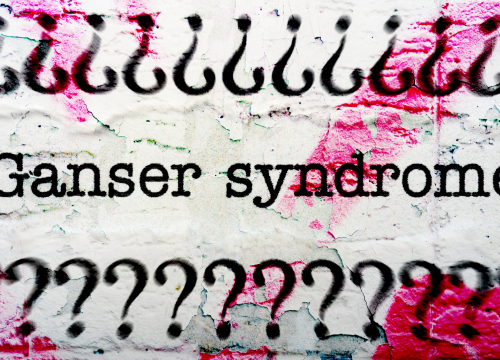Difference Between Ganser Syndrome and Munchausen
An individual with Ganser syndrome often responds to questions in a nonsensical or incorrect manner. The disorder is characterized by dissociative symptoms such as fugue, amnesia, or conversion disorder, often in conjunction with visual pseudo hallucinations. Naughty syndrome is another name for the syndrome.
Munchausen syndrome, another name for factitious condition, is a rare mental illness in which sufferers pretend to be unwell. These people could stage symptoms, act ill, or purposefully make themselves sick. Researchers believe that psychological factors have a role in its development. According to a number of ideas, the start of this syndrome may be linked to a difficult childhood that included abuse or neglect as well as a history of many hospitalizations for different illnesses. Other possible factors include emotions of abandonment and early-life experiences of losing a loved one. Additionally, since personality problems are common in these people, researchers are looking at any possible link between this condition and personality disorders.
Similarity
Both are factitious disorders.

Ganser syndrome
Ganser syndrome sufferers experience brief bouts of strange behaviour resembling those of other severe mental diseases. The individual may exhibit signs of confusion, make ludicrous claims, and report experiencing hallucinations, like hearing voices or seeing objects that are not there.

Munchausen
A person with Munchausen syndrome, often called factitious condition, is an uncommon kind of mental illness in which they pretend to be ill. The individual may fabricate symptoms, pretend as ill, or intentionally mistreat himself.
Difference between Ganser syndrome and Munchausen
Definition
Ganser syndrome
One uncommon dissociative disorder is Ganser syndrome. It has been linked to a number of organic states and functional psychiatric disorders; patients with brain injuries and strokes, particularly those affecting the frontal lobes, are the most common populations for which it has been seen.
Munchausen
A person with Munchausen syndrome, often called factitious condition, is an uncommon kind of mental illness in which they pretend to be ill. The individual may fabricate symptoms, pretend as ill, or intentionally mistreat himself.
Behavior
Ganser syndrome
When answering questions, people with Ganser syndrome may have a particular type of “approximate answers” in which they give answers that are obviously false or illogical yet appear to represent a warped view of reality.
Munchausen
Munchausen syndrome sufferers may compromise their health and well-being by lying to medical experts and going to considerable measures to fool them into having needless tests, procedures, or treatments.
Motivation
Ganser syndrome
Ganser syndrome reasons can be diverse and tied to a desire to escape a bad circumstance or obtain attention, sympathy, or secondary gain.
Munchausen
Munchausen syndrome is often driven by a great need for attention, sympathy, and the role of a “sick” person. It is not always associated with a specific location or constrained area, as in Ganser syndrome.
Summary
The points of difference between a Ganser syndrome and Munchausen have been summarized as below:

FAQ:
What are the criteria for Ganser syndrome?
Criteria for diagnosing Ganser syndrome include:
– Approximate Responses: Individuals give imprecise or incorrect answers intentionally, even though they are capable of providing accurate replies.
– Mental Confusion: Patients often experience temporary mental confusion, appearing disoriented or having difficulties maintaining awareness of their surroundings.
– Voluntary Manifestation of Symptoms: Individuals consciously imitate or amplify psychological or cognitive symptoms as an unconscious response to stress or confinement.
– Stressful or Triggering Factors: Ganser syndrome is typically associated with acute stressors such as imprisonment, emotional distress, or isolation.
– Swift Recovery: Individuals typically recover quickly and completely once the triggering stressor is resolved. Symptoms are usually short-lived.
What is Ganser syndrome also known as?
At first, Ganser syndrome was believed to be rare, occurring predominantly in forensic settings, so it was called prison psychosis until 1897 when Sigbert Ganser described it to 4 prisoners.
Is Ganser syndrome the same as malingering?
Dissociative disorder is the more common diagnosis for Ganser syndrome, while it can occasionally be made on the basis of simple malingering. German psychiatrist Sigbert Ganser is credited with discovering the Ganser syndrome (1853–1931).
What is the modern name for Munchausen syndrome?
When someone falsely asserts that another person exhibits physical or psychological symptoms of sickness, or intentionally inflicts harm or disease on another person with the objective of misleading others, this is known as factitious disorder imposed on another (formerly known as Munchausen syndrome by proxy).
What are the three factitious disorders?
- Munchausen syndrome
- Munchausen by proxy
- Ganser syndrome:
What is the difference between Munchausen and malingering?
To avoid military duty or obtain compensation, malingerers pretend to be ill. Despite knowing that they can be highly manipulative and know that they’re making up their symptoms, Munchausen’s syndrome patients don’t seem to gain any obvious benefits from their behavior.
- Difference Between Global Warming and Greenhouse Effect - May 18, 2024
- Difference Between Vaccination and Immunization - March 3, 2024
- Difference Between Selective Mutism and Autism - February 25, 2024
Search DifferenceBetween.net :
References :
[0]Dieguez, S. (2018). Ganser syndrome. Neurologic-Psychiatric Syndromes in Focus-Part II, 42, 1-22.
[1]Dieguez, S. (2018). Ganser syndrome. Neurologic-Psychiatric Syndromes in Focus-Part II, 42, 1-22.
[2]Di Fiorino, M. (2007). Factitious Disorders: the Münchausen and Ganserian patients. Revista Romana de Psihiatrie, (2-3).
[3]Parker, P. E. (1993). A case report of Munchausen syndrome with mixed psychological features. Psychosomatics: Journal of Consultation and Liaison Psychiatry.
[4]Image credit: https://www.canva.com/photos/MADARTTXqkA-ganser-syndrome/
[5]Image credit: https://www.canva.com/photos/MADsG7yaF0M-employee-suffering-from-dry-eyes-syndrome-or-eyestrain-/
